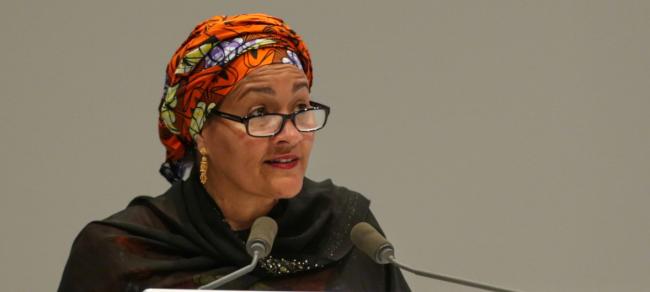
Many deaths can be avoided with better data: UN deputy chief
New York, Oct 23 (IBNS): Speaking at the opening session of the UN World Data Forum on Monday, Deputy Secretary-General Amina Mohammed highlighted the life-saving impact that data can have, noting that better data and forecasting could have averted many deaths from natural disasters.
“While it is clear that the data revolution is having an enormous impact, it has not benefited everyone equally,” said Mohammed, adding that, to achieve the 17 Sustainable Development Goals (SDGs), better and bigger data is needed: “With accurate, representative, inclusive and disaggregated data, we can understand the challenges we face, and identify the most appropriate solutions for sustainable development.
The UN deputy chief outlined other ways that data can improve lives: “It means students can find out about job opportunities and women can learn about laws protecting them from discrimination. It means citizens can monitor how their governments are performing and hold decision-makers to account. It can strengthen trust in public institutions and unveil new opportunities.”
The United Nations, said Ms. Mohammed, is leading global efforts to integrate data and information systems. One example is the Open Data Hub for the Sustainable Development Goals, a tool which provides decision makers with accurate data for informed policy and advocacy.
Another is the global SDG indicator website – which gives users access to all available global information and enables them to see interactive stories about progress on implementing the 2030 Agenda – and UN Global Pulse, which partners with UN experts, governments, academia and the private sector to harness big data for development and humanitarian action worldwide.
Mohammed also mentioned the work of the United Nations Centre for Humanitarian Data, based in The Hague, which is increasing the impact and use of data throughout the humanitarian sector, ensuring that aid workers around the world can access information they need to make fast, life-saving, informed decisions.
Other projects and initiatives include the ID4D partnership with the World Bank, which aims to help countries realise the transformational potential of responsible digital identification systems, and the High-Level Panel on Digital Cooperation, launched by the UN Secretary-General in July 2018 to strengthen inter-governmental cooperation in the digital space.
There is an urgent need for data and statistical systems funding, said Ms. Mohammed, which currently remains limited, and for political, technical and advocacy support in all areas.
Data literacy must be developed, she added, as well as “innovative tools and data visualization platforms, which allow users to understand data intuitively and interact seamlessly with data in real time.”
“UN country teams of the future,” she said, “must be fully equipped with the right skills and capacities to harness the opportunities offered by all types of data and innovation, including emerging technologies such as big data, artificial intelligence, blockchain, robotics and drones.”
Mohammed concluded by inviting all data innovators to work with the UN and help absolutely no one is left behind. To find out more about how digital technology is being to tackle some of the world’s biggest problems, listen to this recent episode of our flagship podcast The Lid Is On.
IISD/ENB | Kiara Worth
Support Our Journalism
We cannot do without you.. your contribution supports unbiased journalism
IBNS is not driven by any ism- not wokeism, not racism, not skewed secularism, not hyper right-wing or left liberal ideals, nor by any hardline religious beliefs or hyper nationalism. We want to serve you good old objective news, as they are. We do not judge or preach. We let people decide for themselves. We only try to present factual and well-sourced news.







